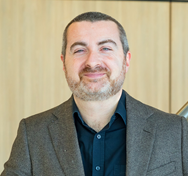
RADNEXT: A distributed research infrastructure for the radiation hardness testing of cutting-edge microelectronic devices
by Ennio Capria (Presenter)
ESRF, European Synchrotron Radiation Facility, France
Abstract – The RADNEXT project, funded by the European Union, endeavors to establish a network of irradiation facilities and associated methodologies to meet the evolving requirements of electronics components and system irradiation. By integrating various irradiation and simulation techniques, RADNEXT aims to enhance radiation hardness assurance for components and systems, with a specific focus on risk assessment. The project aspires to create a global community offering diverse facilities and expertise to cater to the needs of sectors such as space, automotive, medical, and high-energy physics accelerators. In response to the demand for innovative radiation testing methodologies in industries like space, automotive, IoT, nuclear dismantling, and medical applications, RADNEXT seeks to streamline and coordinate testing processes. Recognizing the absence of a coordinated network of cost-effective testing facilities in Europe, the project aims to fill this gap, benefitting both SMEs and large corporations. The development of novel testing methodologies is expected to lead to the establishment of new standards, extending beyond classical space applications and radiation-hardened components. The project emphasizes the pivotal role of Pan-European and National Research Infrastructures in propelling European industry forward by creating a sustainable, coordinated, and streamlined network of irradiation testing facilities. Rather than focusing solely on risk avoidance, RADNEXT advocates for a radiation hardness evaluation based on risk assessment and mitigation. The overarching goal is to enhance and optimize access for system developers to irradiation facilities, replicating representative conditions of their final applications and providing robust validation for end-users. The project envisions a network with a common entry-point, enabling users to define, prepare, conduct, and analyze their irradiation campaigns. Central to this improvement is the harmonization and standardization of system-level testing methodologies, aiming to avoid redundant efforts while collectively advancing towards common objectives.
Ennio Capria
Dr. Ennio Capria is the Deputy Head of Business Development at the ESRF. In his research career he worked on the development of electrochemical nanobiosensors, nanocomposites and optoelectronic devices and particularly their characterisation with synchrotron light. At the ESRF, he is coordinating the participation of the ESRF in various collaborative initiative with industry, in particular on energy storage applications, additive manufacturing methods and nano-sciences. Since 2020 Ennio is Director of the Platform of Advanced Characterisation of the Technological Research Institute Nanoelec. Furthermore, since 2021 Ennio collaborate with the initiative RADNEXT, where he is in charge for the industrial programme and as a chair of the workshop G-RADNEXT.
